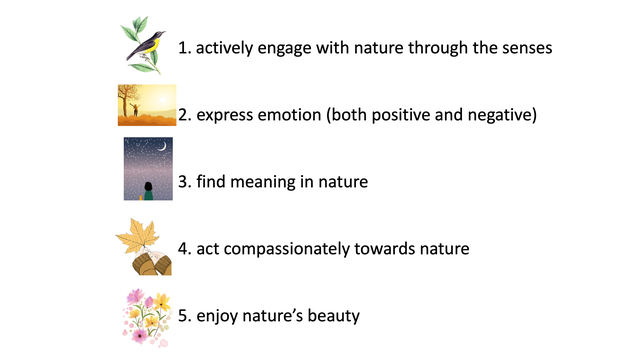Environment
The Sense That You Belong Somewhere
The anatomy of belonging.
Posted December 9, 2021 Reviewed by Michelle Quirk
Key points
- Belonging is a fundamental psychological need that can be nurtured with various skills and practices.
- A recent meta-framework outlines four key components of belonging: competencies, opportunities, motivations, and perceptions.
- Simple nature-connectedness practices can bring more well-being, belonging, and meaning to our lives.
For a fundamental psychological need, belonging is full of paradoxes. We search for it everywhere—in the arms of kin, on familiar streets, among friends with similar beliefs. Yet, there it is—in solitude, in literature, among magnificent trees. Belonging anchors our hearts to our nests. Yet, there it goes—unfastening our wings and setting us free on our quests.

In psychology, belonging has been defined as “a subjective feeling that one is an integral part of their surrounding systems, including family, friends, school, work environments, communities, cultural groups, and physical places” (Hagerty et al., 1992). Belonging, as poet John O’Donohue writes, “suggests warmth, understanding, and embrace.” Lois Bushong, therapist and author of Belonging Everywhere and Nowhere: Insights Into Counseling the Globally Mobile likens satisfying the need for belonging to “showing others your authentic self and getting a thumbs-up.”
Belonging not only feels good—it does us good. From various physical and mental health benefits, to positive relationships and academic and work success, cultivating belonging has been shown to increase well-being.
With its biological underpinnings, belonging often masquerades as a straightforward affair. We are, after all, surrounded by many others to link with, many chances to connect. Yet, most of us know the agony of non-belonging or, as author Zadie Smith writes, turning around during a “huge game of musical chairs” and finding no place to sit. In the brain, the social pain of severed belonging shares neural substrates with physical pain, while in body and mind it can leave a trail of adverse consequences.
A Meta-Framework for Belonging
A recent review by an international team of psychologists offers insights into the anatomy of belonging. In their meta-framework, the authors explore four crucial components of belonging (i.e., competencies, opportunities, motivations, and perceptions), which, as part of our dynamic social systems, interact and influence each other throughout our lifespans.

The good news, according to the authors, is that a sense of belonging can be nurtured and strengthened. We can develop our social, emotional, and cultural skills. We can become more self-aware. We can learn to regulate our emotions more constructively and communicate more effectively. We can align with our values more authentically and connect better—to people, places, and our surrounding systems.
How to Foster More Belonging
Here are key questions to consider by Kelly-Ann Allen, co-author and director of Monash University’s Global Belonging Collaborative, to foster more belonging in our lives.
- Competencies: Do you have the skills needed to relate to others and build healthy, meaningful relationships? If you have the skills, are you investing your time in relationships that can build your sense of belonging? Having skills and competencies that relate to your ability to resolve conflict, regulate your emotions, and utilize your psychological assets like empathy and kindness can go a long way toward building relationships. These social and emotional competencies that sometimes are referred to as “soft skills” are, in fact, core skills when it comes to building belonging.
- Opportunities: Opportunities are about what is available in order to feel a sense of belonging. Are you joining groups and engaging with others? Even despite the social challenges brought on by the pandemic, have you found alternative ways to relate to other people? Consider your hobbies, sports, recreation, and further learning as opportunities where you might find others with common interests.
- Motivations: We all have the need to belong. Yet, the motivation to fulfill this need can vary from person to person, and throughout our lifetime. Are you truly motivated to belong, to connect with others, and to feel like a part of the surrounding systems? If the answer is a resounding yes, then you’ll more likely seek opportunities for connection.
- Perceptions: Often, it’s easier to see why you don’t belong. Instead of giving in to the tendency to focus on negative feelings of rejection and isolation, try to flip this thinking. How do you belong already? What makes you feel included, accepted, and valued? Perceptions about belonging can influence how we feel and behave. We can create a negative loop and engage in behaviors that don’t help our sense of belonging (i.e., if we think we don’t belong, we might withdraw). Understand that feeling like you don’t belong at times is normal. Not only can this be temporary, but there are also things we can do to actively build our sense of belonging.
Finding Belonging Within
Sometimes, the most poignant revelations about belonging can unfold during our biggest challenges to belong. Bushong has witnessed this over and over again with her expat clients in throes of cross-cultural transitions, far from the people and places they call home. Her advice: Keep seeking new connections and keep proactively looking for things in the new environment to get in touch with the deep-rooted feelings of belonging within. Because, although we often look outward to quell our need for belonging, believing ourselves at the mercy of the benefaction of circumstances, the gift of belonging is already ours.
Finding Belonging Through Nature
There is another relationship that can play a vital role in our well-being and satisfy some of our fundamental needs of meaning, purpose, and connection. That pathway to belonging lies through nature.
“As social creatures, we have evolved in concert with nature for millions of years,” explains Ryan Lumber from De Montfort University who researches nature-connectedness:
Our propensity to engage with life and to form social bonds is not restricted to people. Nature is one such entity we can do it with. At the heart of nature-connectedness lies a meaningful relationship with nature. It’s the feeling that we are not separate from nature—instead, we are part of a much wider natural community and, thus, connected to something much bigger than ourselves. That’s where the magic happens.
Here are three ways to nourish our sense of belonging with the help of nature, according to Dr. Lumber.:
1. Take time to notice nature. How much are you actually paying attention to the world around you? Spending our time absorbed in our screens, we can often miss nature’s magnanimous offering of everyday wonder. Any beneficial encounter—including the one with nature—begins with taking notice.
2. Make your encounter with nature meaningful. When it comes to nature-connectedness, it’s important to consider how you spend your time in nature. Beyond being in natural spaces passively, establish a deeper and more meaningful connection with nature through the Five Pathways framework:

These simple, pathway-driven activities can deepen our relationship with nature and have powerful physical and mental benefits.
3. Build nature-connection practices into your everyday. From a small insect hurrying about its day along the cracks of a tree's bark to the boundless sky, nature is all around us. Connecting to it daily can foster our belonging with the natural world, help us appreciate our place within it, and infuse our lives with meaning. As a result, we can improve our well-being and that of nature.
Belonging Already
Ultimately, belonging is a way of being with, of relating—to ourselves, to others, and to the world around us. In our bleak moments of disconnection, it may be comforting to remember that not only do we already inherently belong by the virtue of being here now, but the arms where we seek belonging open much wider than we imagine.
May there be kindness in your gaze when you look within.
May you never place walls between the light and yourself.
May you allow the wild beauty of the invisible world to gather you,
Mind you and embrace you in belonging.
–John O’Donohue, For Belonging
Many thanks to Kelly-Ann Allen, Ryan Lumber, and Lois Bushong for their time and insights. Dr. Kelly-Ann Allen is a senior lecturer at Monash University’s School of Educational Psychology and Counselling. Dr. Ryan Lumber is a senior lecturer of environmental psychology at De Montfort University. Lois Bushong is a counselor and author of Belonging Everywhere & Nowhere: Insights Into Counseling the Globally Mobile.
References
Allen, K. A., Kern, M. L., Rozek, C. S., McInerney, D. M., & Slavich, G. M. (2021). Belonging: a review of conceptual issues, an integrative framework, and directions for future research. Australian Journal of Psychology, 73(1), 87–102.
Slavich, G. M., & Cole, S. W. (2013). The emerging field of human social genomics. Clinical Psychological Science,1(3), 331–348.
Allen, K. A., Kern, M. L., Vella-Brodrick, D., Hattie, J., & Waters, L. (2018). What schools need to know about fostering school belonging: A meta-analysis. Educational Psychology Review, 30(1), 1–34.
Walton, G. M., & Cohen, G. L. (2011). A brief social-belonging intervention improves academic and health outcomes of minority students. Science, 331(6023), 1447–1451.
Hagerty, B. M., Lynch-Sauer, J. L., Patusky, K., Bouwsema, M., & Collier, P. (1992). Sense of belonging: A vital mental health concept. Archives of Psychiatric Nursing, 6(3), 172–177.
Hale, C. J., Hannum, J. W., & Espelage, D. L. (2005). Social support and physical health: The importance of belonging. Journal of American College Health, 53(6), 276–284.
Ghosh, R., & Reio Jr, T. G. (2013). Career benefits associated with mentoring for mentors: A meta-analysis. Journal of Vocational Behavior, 83(1), 106–116.
Wallace, T. L., Ye, F., & Chhuon, V. (2012). Subdimensions of adolescent belonging in high school. Applied Developmental Science, 16(3), 122–139.
Eisenberger, N. I. (2015). Social pain and the brain: controversies, questions, and where to go from here. Annual Review of Psychology, 66, 601–629.
Cacioppo, S., Grippo, A. J., London, S., Goossens, L., & Cacioppo, J. T. (2015). Loneliness: Clinical import and interventions. Perspectives in Psychological Science, 10(2), 238–249.
Hagerty, B. M., & Williams, A. (1999). The effects of sense of belonging, social support, conflict, and loneliness on depression. Nursing Research, 48(4), 215–219.




